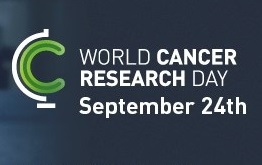
World Cancer Research Day (WCRD) is a global initiative aiming to raise awareness worldwide about the importance of cancer research and the dedication of cancer researchers.
Led by 11 organisations worldwide, including the National Cancer Institute (NCI), the European Association for Cancer Research (EACR) and Cancer Research UK, researchers are joining together to celebrate World Cancer Research Day.
Globally, the incidence of cancer is rising. Estimates show that cancer will be the leading cause of death in the coming years with an increase to 21.6 million new cases across the world each year by 2030 and 13 million deaths. This means that by 2030 one person will die of cancer almost every two seconds and one person will be diagnosed cancer every 1.5 seconds.*
In the UK it is predicted that by 2030 there will be over 424,000 new cancer cases each year and 214,000 deaths caused by the disease. one person will be diagnosed of cancer almost every 1 minute and a person will die from cancer almost every 2 minutes.*
But it’s not all bad news. Researchers have made significant progress in the prevention, diagnosis and treatment of cancer and the survival rate is now around 50% in the UK, having doubled over the last 40 years.
But there’s still a long way to go to in detecting cancer as early as possible and finding better kinder treatments for the disease. Researchers across the world are working tirelessly to get closer to the breakthroughs needed to continue to improve survival rates and quality of life for cancer patients.
Ted Trimble, Director of the NCI Center for Global Health shares his story about why he has dedicated his career to improving outcomes for women with ovarian, endometrial and cervical cancers. He discusses how important it is for scientists across the world to work together to make progress in preventing, detecting and treating cancer to tackle this global health issue.
CRUK Cambridge Centre Director Professor Richard Gilbertson also recalls a pivotal experience thirty years ago that has driven his impressive research achievements. When he was a medical student on the children’s ward at Newcastle General Hospital, he looked around the ward and saw a child in a bed, in a dark corner. “She has a medulloblastoma that has returned,” the consultant said. “What can we do for her?” asked Gilbertson, who had been fascinated by medulloblastomas – one of the commonest malignant brain tumours in children – since his first year of medicine, when he was randomly assigned to do a project on them. “Nothing,” the consultant replied. “The only thing we can do is let her die in peace.”
“I got so angry,” remembers Gilbertson. “It was the 1980s and there was nothing we could do for a child with a brain tumour. That was completely unacceptable to me. And I know it sounds contrived, but I made up my mind from that moment that I was going to do something.”
That ‘something’ was initially a number dreamed up in a Newcastle pub: relaxing with a beer after a long week, Gilbertson and his fellow medical students decided that by the time they retired, they should take personal responsibility for implementing a 15 per cent reduction in mortality, from whatever disease they chose. He pledged to implement a 15 per cent reduction in mortality from children’s brain cancer.
Gilbertson never forgot that pledge and, 30 years later, you could argue that he’s fulfilled it. As a result of his insights into how children’s brain tumours behave, more children than ever before are surviving them. However this, he argues, is because of better patient care and understanding of the condition, not more effective treatments, earlier detection or prevention. These are the things, he says, that will fulfil his latest ambition: a world without cancer.
This is why for the future of cancer research, Professor Gilbertson won’t stand still and supports World Cancer Research Day.
* figures from the International Agency for Research on Cancer (IARC), part of the World Health Organisation (WHO)















